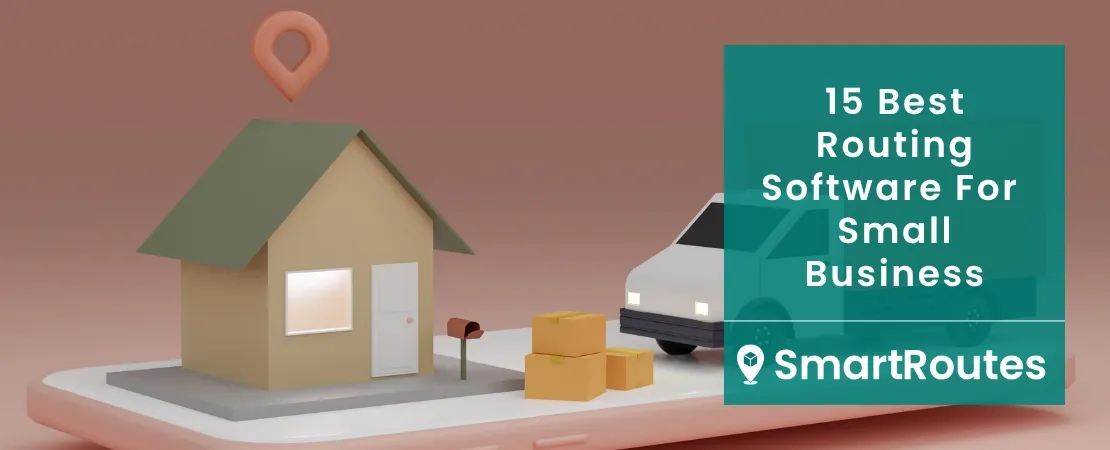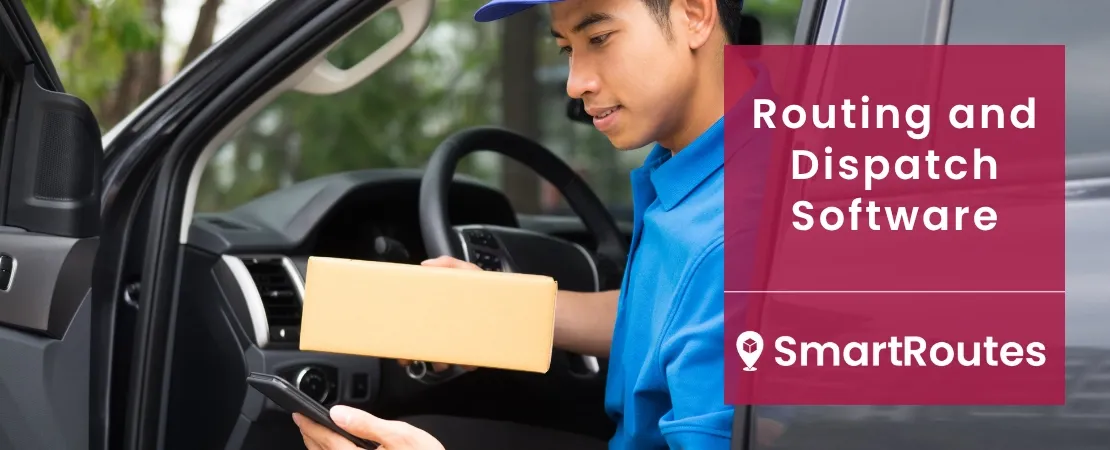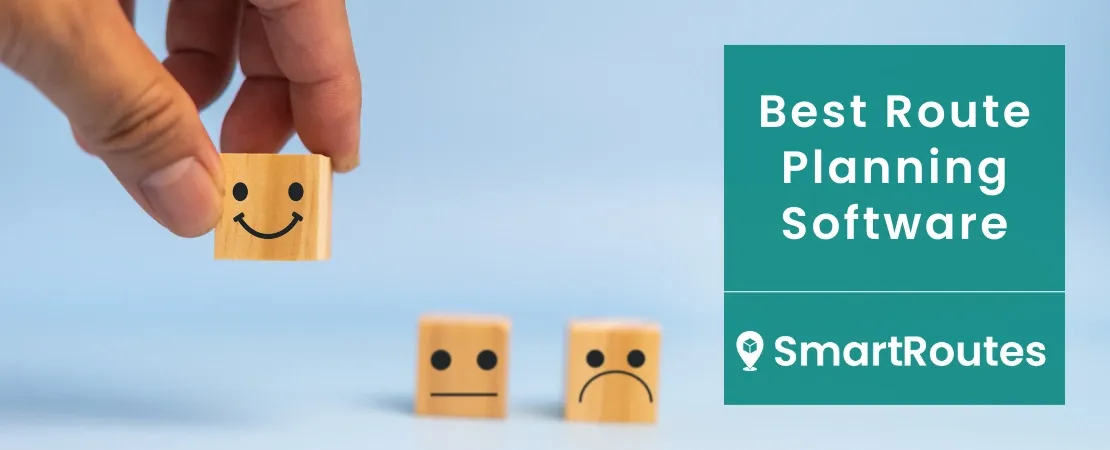Quick Summary
- This blog reviews 9 of the top route planning software solutions, including SmartRoutes, Spoke, Routific, Route4Me, OptimoRoute, Badger Maps, TrackPOD, Onfleet, and Detrack, based on verified user experiences, features, and pricing.
- The best route planning software consistently combines ease of use, reliable route optimization, real-time driver tracking, and customer communication, helping businesses save time, reduce costs, and improve delivery efficiency.
- Users repeatedly highlight the benefits of optimized routes, including reduced mileage, faster deliveries, and more balanced workloads for drivers.
- Common challenges across platforms include pricing transparency, limited customization, and mobile usability, which are key considerations when choosing a solution.
Finding the right route planning software can be tricky, especially with so many options on the market claiming to do so much.
To get a clearer picture of what really works, I collated a large number of verified user reviews from across the top platforms. My goal was to see what actual day-to-day users found useful and where they felt the software could improve, giving a more unbiased view than just relying on feature lists or free trials.
Let’s take a closer look at some of the best route planning software available today, comparing features, pricing, and user feedback so you can make a more informed choice for your business!
Quick Comparison of Top Route Planning Software
Here’s the 9 route planning solutions I reviewed, based on verified user experiences, features, and pricing.
- SmartRoutes: Best for teams of all sizes that need a full-service delivery planning solution.
- Spoke (formerly Circuit): Ideal for high-volume daily routes.
- Routific: Strong for teams needing easy driver onboarding and flexible route dispatch.
- Route4Me: Suited for large-scale operations needing multi-driver management.
- OptimoRoute: Great for companies focused on efficiency and analytics.
- Badger Maps: Focused on sales territory management and mapping.
- TrackPOD: Works well for teams needing proof of delivery, automated notifications, and real-time tracking.
- Onfleet: Excellent for large, data-driven operations.
- Detrack: Reliable for small to medium delivery fleets focused on real-time tracking and proof of delivery.
9 Best Route Planning Software, Compared (with features, pricing and user reviews)
This section breaks down each tool, highlighting key features, user feedback, pricing, and what makes each one stand out. By looking at both strengths and areas for improvement, you can see which software fits your team’s needs and delivery operations best.
1. SmartRoutes
SmartRoutes is a delivery route planning tool built for last-mile teams. It is the kind of software you can get up and running quickly, without needing weeks of setup or training.
From the reviews I looked at, people tend to stick with SmartRoutes because it makes delivery planning much easier for them. Planning deliveries takes less time, routes make more sense, and communication with both drivers and customers improves pretty much straight away.
Key features:
- Multi-stop route optimization
- Real-time driver tracking and live location updates
- Delivery zones based on geo-location
- Driver mobile app with built-in navigation
- Automated customer notifications and tracking
- Order imports from platforms like WooCommerce
- Custom delivery fields and notes
A big selling point among users is how easy it is to use. Even businesses doing proper route planning for the first time said they were able to upload orders, create routes, and send them to drivers with very little effort (or technical know-how!).
A few things that came up again and again in reviews were: less manual planning, fewer mistakes, and smoother delivery runs. Many also stated they could see the time savings as soon as the route loaded in.
For seasonal businesses, flexibility matters. Being able to change subscriptions month by month meant they only paid for what they needed, when they needed it.
Several reviews mentioned that once drivers saw shorter days and more balanced routes, they became more accepting of the app.
Live tracking was also seen as genuinely useful because dispatchers could see what was happening in real-time and react to delays or changes, rather than finding out after the fact.
SmartRoutes Route Planning Software
Streamline your entire delivery process, all from one platform

For customers, automated emails and tracking links helped cut down on “where is my delivery” calls and the customer portal added an extra layer of visibility without extra work for the team.
Most of the downsides mentioned were small. A few users wanted more control over custom fields. There were also mentions of relying on Google Maps for accuracy in routes.
Overall, SmartRoutes feels like a practical, no-nonsense option for delivery teams that want better routes without complexity.
Pricing
- The basic is starts from €29 per month and includes basic route planning, the driver app and file imports.
- The second tier, essentials, starts at €49 per month and this includes everything in the basic package plus extras like live tracking, and customer notifications
- The premium tier starts at €59 per month and this again includes full feature access, integrations, customization, and added support
⭐ User rating: 4.8
2. Spoke (formerly Circuit)
Spoke is a route planning tool built for speed and simplicity. It is commonly used by teams handling lots of daily routes and repeat delivery schedules.
Users tend to describe Spoke as reliable and easy to work with. It is not trying to do everything. Instead, it focuses on getting routes planned quickly and keeping day-to-day delivery operations moving.
Key features:
- Multi-stop route optimization with no hard stop limits
- Spreadsheet-based route imports
- Driver navigation with turn-by-turn routing
- Live driver location tracking
- Basic delivery scheduling
- Support for frequent route changes and re-optimization
Speed comes up a lot in reviews, dispatchers like how quickly they can import spreadsheets, build routes, and re-optimize plans when things change. For teams running 10 or more routes a day, this made a noticeable difference.
Spoke can also suit businesses where delivery plans change regularly. Being able to adjust routes without starting from scratch was a big plus for many users. Several reviewers mentioned switching from free mapping tools and immediately seeing time savings. Planning felt more structured, and routes were easier to manage at scale.
Live location tracking gives dispatchers visibility during the day, which helps when deliveries fall behind or routes need adjusting. That said, once a route is sent out, control can feel limited. A number of users mentioned that changing stop orders or making manual edits after dispatch was awkward or not always possible.
Customization was a common sticking point among reviewers. Some teams wanted more control over stop orders and route adjustments, especially mid-day.
Delivery scheduling also came up, particularly for businesses working with tight or fixed delivery windows. A few users felt this side of the product could be stronger.
Mapping accuracy was mentioned as well. While generally reliable, some users reported occasional issues in rural areas or mixed urban routes, such as unsuitable roads or nearby but incorrect addresses.
Integrations were another area where users wanted more options. Requests for an API, stronger Shopify syncing, and better delivery status updates appeared multiple times in reviews.
Pricing was also flagged, especially for teams scaling up. Costs were often described as reasonable at smaller volumes, but harder to justify as route numbers increased.
Pricing
- Starter: $125 per month for 1000 stops and 4c then for stops over 1000
- Premium: $200 per month for 2000 stops and 6c for additional stops
- Expert: $1000 per month for 12000 stops and 7c for over 12000
User rating: ⭐ 4.8
3. Routific
Routific is a route planning tool built with dispatchers in mind, not solo drivers working on their own. It is designed for teams running multiple vehicles who need to create routes quickly, get drivers moving fast, and avoid long setup or training.
From the reviews I looked at, Routific is often chosen by teams that want structure and flexibility without adding advanced technology into the mix. It handles complexity well, but still feels approachable in the day to day.
Key features
- Multi-driver route optimization
- Route dispatch via SMS
- Driver app with choice of navigation apps
- Customer delivery notifications by SMS or email
- Live driver location tracking
- Spreadsheet and CSV imports
Routific users find it quick and easy to get setup on the system. Dispatchers also spoke positively about how fast routes can be built and sent out. Even teams with multiple drivers and tight delivery windows said the system stayed responsive and easy to manage.
Ease of use came up again and again. Both the dispatcher dashboard and the driver experience were described as clean, clear, and quick to learn.

Drivers can open routes in the navigation app they already use, whether that is Google Maps, Waze, or Apple Maps. That flexibility helped reduce resistance from drivers who prefer sticking with familiar tools.
For more technical teams, the API stood out. Reviews described it as well documented and easy to integrate, allowing businesses to automate route creation or connect Routific with existing systems.
Pricing was the most common downside. While the free tier works well for very small teams, costs rise quickly as order volumes increase. Several users mentioned frustration with add-on charges, particularly for customer notifications and certain reporting or note-related features.
Some users also felt pricing based on orders and vehicles was harder to justify as fleets grew.
Feature limitations came up less often, but they were still noted. These included limited options for mixing notification types, fewer custom note fields for drivers, and slower performance when managing very large routes with hundreds of stops. A small number of users also wanted more detailed GPS data and post-route reporting.
Routific feels polished and well thought out. It shines when ease of use, fast driver onboarding, and dispatcher control are top priorities.
Pricing
- Up to 100 orders – Free: Suitable for very small teams or trial use
- 100 to 1,000 orders – $150 per month: Flat fee covering up to 1,000 deliveries
- Orders above 1,000: Charged in blocks once orders go above the initial allowance, starting at 15c per order for 100 extra stops and this comes down once over 1,000 extra stops are added so the more you add the better value you get per order
⭐ User rating: 4.9
4. Route4Me
Route4Me is one of the more established names in route planning and optimization. It’s aimed at teams running large delivery volumes or managing complex routes.
From the reviews I looked at, it’s popular with organizations that need advanced controls, manual route tweaking, and reliable support but it comes with a steeper learning curve and higher costs than many alternatives.
Key features:
- Multi-route and multi-driver optimization
- Drag-and-drop route editing directly on the map
- Support for time windows and preset ETAs
- Mobile apps for drivers (iOS and Android)
- Custom mapping and route exports
- 24/7 live customer support
Users highlighted the ability to see multiple routes on a single map, adjust stops by dragging and dropping, and plan around time windows or preset ETAs. For high-volume operations, this was seen as a huge advantage.
24/7 live support and onboarding sessions were repeatedly mentioned, especially for teams dealing with unusual or large-scale routing challenges.
Route4Me’s drag-and-drop editing makes it easy to fine-tune optimized routes, and live driver tracking keeps dispatchers informed throughout the day.
That being said, it’s not the simplest software to pick up. Many users pointed out a noticeable learning curve, with multiple screens needed to navigate and slower load times on large routes. Teams new to route planning software may find it overwhelming at first.
Pricing was the biggest pain point I noticed that came up in multiple reviews. With entry costs being high and add-ons required at each tiered plan.

Data and mapping weren’t perfect either. Some users reported postcode issues, occasional address errors, duplicate stops, or inefficient stop sequencing. Mobile app performance and syncing between iOS and Android were also brought up as being inconsistent.
Pricing
- Custom pricing only: Pricing is no longer published publicly and requires contacting sales
- Tiered plans: They have 3 tiers; Route Optimization, Business Optimization, Enterprise Optimization. Key features may be locked behind paid add-ons within each tier
⭐ User rating: 4.5
5. OptimoRoute
OptimoRoute is a route planning and optimization tool built to help businesses of all sizes manage deliveries and fleets more efficiently. From the reviews I looked at, it’s especially popular with teams that need flexible scheduling, real-time driver tracking, and detailed reporting without much technical expertise. For many, it’s the kind of tool that quickly pays for itself.
Key features:
- Real-time driver tracking and monitoring
- Pickup and delivery sequencing with flexible time windows
- Reporting on travel distances, working hours, and completed deliveries
- Exportable performance data
- API integration for ERP or backend systems
- Overnight route planning tools
A standout theme is time savings. Users reported completing up to 30% more deliveries each week without adding extra drivers or vehicles. Routes are optimized, fleets are better utilized, and the drag-and-drop interface makes last-minute changes easy.
Real-time tracking is another strong point. Dispatchers can monitor drivers throughout the day and respond quickly to delays, while automated notifications to customers help reduce “where’s my delivery?” queries.

Reporting and analytics also get high marks. Teams use the data to see how routes, working hours, and distances add up, helping them make smarter operational decisions.
Planning is flexible and intuitive. Routes can be adjusted on the fly with drag-and-drop controls, and the platform handles complex scheduling like pickups, deliveries, and flexible time windows.
The mobile-friendly driver interface keeps teams connected without forcing them into complicated workflows. Proof of delivery, order tracking, and overnight route planning (Pro tier) add another layer of efficiency for growing operations.
Most issues are minor. Users mentioned that deleting or reassigning orders on live routes can be clunky, mobile/tablet admin options are somewhat limited, and overlapping routes can occasionally cause planning interruptions.
Pricing was also noted as relatively high for smaller teams, though most reviewers agreed the features justify the cost for businesses scaling up.
OptimoRoute is ideal for companies that want a balance of powerful route optimization, scheduling flexibility, and detailed tracking. It works particularly well for teams managing multiple drivers and dynamic delivery requirements.
Pricing
- Free trial: 30 days (one of the longest trials offered)
- Lite for $39 per month: Up to 700 orders, basic routing and scheduling
- Pro for $49 per month: Adds proof of delivery, analytics, and order tracking
- Custom package: Pricing can be requested from sales and this tier includes advanced features, higher support, larger fleet capabilities
⭐ User rating: 4.6
6. Badger Maps
Badger Maps is a route planning and sales mapping tool that mixes route optimization with territory and customer management. From the reviews I looked at, it’s especially handy for teams managing lots of client locations, tracking sales activity, and visualizing territories. It’s not really built for high-volume delivery fleets.
Many users highlighted how it helps organize accounts, plan efficient visits, and keep sales or service teams on top of their schedules.
Key features:
- Multi-stop route optimization for sales or delivery visits
- Interactive heat maps for customer visualization
- Territory and account management
- Drag-and-drop route adjustments
- Data export and reporting
Speed and usability came up again and again. Routes can be created in just a few minutes, and the drag-and-drop interface makes adjusting stops simple. The mapping and territory visualization features were often praised, particularly for sales teams with widely spread customers.
Customer support and onboarding also stood out. Users appreciated responsive guidance, including walkthroughs and video calls to explain features like heat maps, filtering, and territory management.
Some minor frustrations came up in reviews. A few users mentioned occasional app crashes, trouble saving notes consistently, or challenges updating addresses on active routes. Customization options for map views and filtering can be limited, and small teams with fewer clients sometimes found features overbuilt for their needs.
Overall, these issues didn’t stop most users from seeing clear time savings and improved organization.
Pricing
- Business plan for $58 per month: Up to 2,000 records/accounts, core routing and mapping features
- Enterprise plan for $95 per month: Up to 10,000 records/accounts, advanced CRM integration, enhanced reporting
⭐ User rating: 4.6
7. TrackPOD
Track-POD is a delivery route planning and logistics platform designed to make last-mile operations smoother for fleets of all sizes. Based on the reviews I found, it really stands out for real-time tracking, automated customer notifications, and easy adoption. This definitely makes it a popular choice for teams wanting to get a handle on efficiency and improve customer communication.
Key features:
- Route optimization and multi-stop scheduling
- Real-time driver tracking and visibility
- Automated customer notifications (email & SMS)
- Electronic proof of delivery (ePOD)
- Pickup and delivery scheduling
- Custom forms and vehicle checks
Many teams said they could onboard new staff and start scheduling deliveries within hours, even for employees with limited technical experience. Real-time tracking and automated notifications were praised for keeping operations running smoothly while keeping customers in the loop.
Customer support was also highly praised with many reviews sharing that they appreciated quick responses and helpful guidance (especially when troubleshooting notification issues).
Some users mentioned minor issues with the notification system (occasional missed messages or SMTP disconnections). Customization for workflows and driver management is limited, and some mobile app features differ between iOS and Android. A few minor interface quirks, like selection problems on the orders page, were also mentioned.
TrackPOD is well-suited for companies that want a user-friendly route planning and delivery management platform without a steep learning curve.
Pricing
TrackPOD allows you to either pay per driver or per order, in the following packages:
Per driver packages (minimum 3 drivers per package):
- Standard: $59/month
- Advanced Plus: $79/month
- Ultimate: $99/month
- Enterprise: Custom pricing (minimum 20 drivers)
Per order packages:
- S Plan: $285 for 1,500 orders
- M Plan: $510 for 3,000 orders
- L Plan: $900 for 6,000 orders
- XL Plan: $1,440 for 12,000 orders
⭐ User rating: 4.7
8. Onfleet
Onfleet is a last-mile management platform built for teams handling high task volumes (delivery and collections). Going by user reviews, it’s mostly used by growing or already established operations. It’s clearly aimed at businesses with large order volumes.
Key features:
- Route planning and advanced route optimization
- Real-time driver tracking with live ETAs
- Automated customer notifications
- Proof of delivery, including signatures, photos, and barcodes
- Task history and performance reporting
- Carbon offset tracking
- Web-based dispatcher and driver interfaces
Many users liked having tasks, drivers, routes, and performance data all in a single dashboard as it reduced the need to jump between tools & screens.
Reliability also came up a lot and automated notifications were described as solid and consistent, even for operations handling thousands of ‘tasks’ each month.

Many reviews praised how easy it is to connect Onfleet to existing systems, including POS tools and other logistics platforms. Reviews suggested it performs well at scale and supports a wide range of delivery use cases.
Performance was the most commonly reported concern. Some users experienced lag when filtering large datasets, uploading big spreadsheets, or managing very high task volumes.
Some reviews also mentioned limited flexibility for custom fields, and some automation features occasionally overwriting data in ways users didn’t expect.
Offline functionality also came up, particularly for drivers working in low-signal areas, where limited offline support caused friction.
Pricing feedback was mixed, while many teams felt the platform delivered value, others were frustrated by rising costs, paid add-ons for commonly used features, and price increases over time.
Pricing
- Launch for $599 per month: Includes 2,500 tasks, basic route optimization, proof of delivery, and API access
- Scale for $1,299 per month: Includes 5,000 tasks, barcode scanning, advanced route optimization, and dynamic ETA notifications
- Enterprise for $2,999 per month: Includes 10,000+ tasks and premium support
⭐ User rating: 4.6
9. Detrack
Detrack is a delivery route planning that’s popular with small to mid-sized fleets, especially in courier, retail, and distribution. From the reviews I looked at, teams usually choose it for affordability rather than advanced routing capabilities or thorough reporting.
It’s a practical option for teams that want visibility and accountability without a lot of setup!
Key features:
- Delivery route planning with basic route optimization
- Real-time driver tracking
- Automated proof of delivery with photos, signatures, and timestamps
- Branded customer notifications by SMS and email
- Vehicle checks and task updates in near real time
- Web-based dispatcher dashboard
- Multi-region support with strong usage across Asia
Simplicity is the big draw with many users saying they were up and running quickly, even without dedicated IT support. Drivers tend to get comfortable with the mobile app fast, which helps reduce training time.
Photos, signatures, and timestamps helped cut down on disputes and made deliveries clearer for both teams and customers. Real-time tracking added to that transparency, especially during busy periods.
Drivers use the mobile app on Android or iOS to update jobs, complete vehicle checks, and capture proof of delivery. Updates come through close to real time, so dispatchers are not left guessing.
This shared visibility between drivers, dispatchers, and customers was mentioned often as a real benefit.
As operations grow however, feature gaps become more noticeable. Reporting is fairly basic, and many users said they needed to export data to Excel to get meaningful insights.
Route changes and delivery resequencing can feel clunky, and recurring jobs or schedule management caused confusion for some teams.
Integrations were another common frustration. Billing and accounting workflows, especially with tools like Xero, were described as limited. Customisation options are also fairly restricted, with users wanting more control over branding, alerts, and job templates. Some features, such as customer notifications, rely on third-party tools that felt complex for non-technical users.
Support feedback was mixed. While onboarding was often described as helpful, some reviewers noted slower response times and less technical depth as the company scaled. Pricing increases over time were also mentioned, with per-vehicle costs becoming harder to justify for smaller fleets.
Pricing
- Pro for $29 per vehicle per month: Live driver tracking, proof of delivery and branded customer notifications
- Advanced for $39 per vehicle per month: Adds route optimization, vehicle checks, and extra operational features
- Enterprise, Custom pricing: Built for fleets with over 100 vehicles, with advanced onboarding and support
⭐ User rating: 4.6
How I Gathered This Data
Rather than just relying on free trials or marketing materials, I wanted to get a genuine sense of how these tools perform day to day. To do that, I reviewed and collated a large number of verified user reviews from multiple platforms, including Capterra, G2, Google Reviews and other trusted sources. By looking at real-world experiences, I could see what features users actually found useful, where they ran into challenges, and how the software impacted their delivery operations.

This approach allowed me to capture insights from businesses of all sizes, small teams just starting out, mid-sized fleets, and larger operations managing complex routes. I paid close attention to recurring themes in the feedback, such as usability, route optimization, driver communication, and pricing transparency.
This way, the comparisons you’ll see in the next section are grounded in what actual users have experienced, giving a more unbiased and practical view than you’d get from a trial alone.
Difference Between Route Planning and Optimization
When I first started digging into these tools, I realized a lot of people use the terms route planning and route optimization interchangeably, but they’re not exactly the same.
Route planning is essentially the process of creating a route from point A to point B, often with multiple stops. It’s about organizing deliveries in a logical order so drivers know where to go and when.
Route optimization, on the other hand, goes a step further. It uses algorithms to find the most efficient routes, taking into account factors like traffic, delivery windows, vehicle capacity, and even driver schedules. In practice, route optimization can save significant time and fuel costs, reduce driver stress, and improve customer satisfaction.
Understanding this distinction was important when reviewing each platform. Some tools excel at simply laying out routes quickly, while others focus on dynamic route planning and delivery route optimization to squeeze every bit of efficiency out of a fleet. Knowing what your business actually needs helps separate the tools that look good on paper from those that deliver real-world results.
Benefits of Route Optimization
As I reviewed user feedback across these platforms, one thing became clear: the real value of route planning software comes when it’s paired with strong route optimization. From what I gathered, there are a few benefits that almost every user highlighted.
First, time savings is huge. Many drivers and dispatchers mentioned cutting hours off their daily planning and driving, which frees them up for more deliveries or other tasks. I also noticed that fuel and cost efficiency was a common theme (optimized routes not only reduce miles driven but also help teams save on vehicle wear and tear).
Another benefit that stood out was improved customer satisfaction. Users repeatedly mentioned features like live tracking, automated notifications, and delivery windows as very important for keeping customers informed and happy. Finally, I found that optimized routes make scaling operations much easier. Businesses can take on more stops or expand delivery areas without needing a larger fleet, because the software handles the complexity of routing for them.
Wrapping Up Our Route Planning Software Review
Looking through all of these platforms and reading thousands of verified user reviews gave me a much clearer picture of what works and what doesn’t, when it comes to route planning software. What stood out most is that no single tool is perfect for every business. Some shine with dynamic route optimization, while others excel at simple, intuitive route planning for smaller fleets.
From my research, I saw that the best route planning software consistently balances ease of use, flexibility, and features that actually help drivers and dispatchers save time, reduce costs, and improve customer experience. Pricing, customer support, and real-world reliability also make a big difference, so it’s worth considering not just the feature list but the overall experience reported by users.
Ultimately, the key takeaway is that investing in the right route planning and optimization solution can transform how deliveries are managed. If you want to try SmartRoutes before you buy, you can avail of our 7 day free trial.
FAQ
1. Can Google Maps do route planning?
Google Maps can act as a basic route planner, helping you map a series of stops and get directions between them. However, it doesn’t offer advanced route optimization software features like multi-driver scheduling, time window management, or automated adjustments. For larger delivery operations, dedicated routing tools provide more efficiency and control.
2. What is route planning software?
Route planning software is a digital tool that helps businesses create and manage efficient delivery routes. It goes beyond simple mapping by optimizing stop order, factoring in traffic, vehicle capacity, and delivery windows. Routing software saves time for dispatchers and delivery drivers while improving overall operational efficiency.
3. How much does route planning software cost?
The cost of route planning software varies depending on features, fleet size, and subscription model. Tools may start as low as $29 per month, while enterprise solutions with advanced route optimization software and dedicated customer service can run several hundred dollars to thousands monthly. Many platforms offer free trials to test features before committing.
4. How to plan a delivery route
Planning an efficient delivery route involves mapping all stops, considering time windows, and minimizing total travel distance. Using a route planner allows you to automate these steps, assign tasks to delivery drivers, and make last-minute adjustments without confusion. Proper planning can cut costs, reduce driver stress, and improve customer satisfaction. Learn more
5. Which tools help optimize delivery routes for drivers?
Several platforms act as route optimization software for delivery drivers, including SmartRoutes, Routific, Onfleet, and TrackPOD. These tools automatically calculate the fastest or most efficient delivery routes, provide real-time tracking, and offer features like automated notifications to customers, helping teams save time and fuel while keeping operations smooth.
6. How to choose route planning software
When selecting routing software, consider ease of use, live ETAs, analytics capabilities, and customer service quality. Look for platforms that optimize delivery routes, handle your fleet size, integrate with your systems, and offer clear pricing. Reviewing verified user feedback can give insights into what works best in real-world operations.
If you enjoyed this blog, you might also be interested in:




